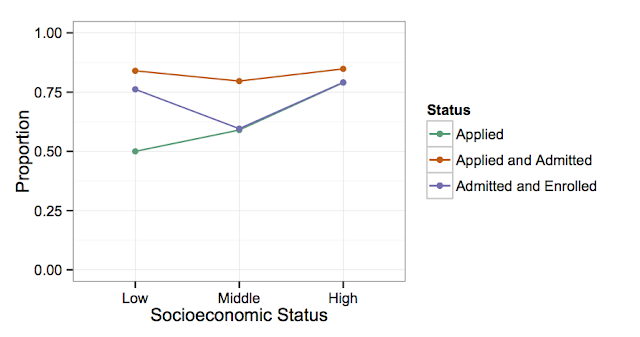The research cited there by Alexandria Radford focused on high school valedictorians, which I think is a pretty cool way to isolate the effect of socioeconomic class. Sociological Images posted this figure from the paper (abstract? proposal?) which shows what proportion of valedictorians wind up in each category with regards to highly selective colleges
- They applied to at least one highly selective school.
- They were accepted to at least one highly selective school.
- They enrolled in a highly selective school.
Radford attributes the large gap between High SES valedictorians and Middle and Low SES valedictorians to reduced familiarity with highly selective schools as institutions and their admissions process. That seems to ring true to me, but I was curious how SES affects each step in this process. The graph above doesn't really tell you what proportion of Low SES students who actually applied to highly selective schools were admitted, or at least I don't believe it does. It says 42% of Low SES valedictorians were admitted to a highly selective school, but you have to apply to be admitted, and only 50% of Low SES valedictorians applied in the first place. That means that 42%/50% = 84% of Low SES students who applied were admitted. The same goes for enrollment. You have to be admitted to be enrolled, meaning the 32%/42%=76% of Low SES students who were admitted to a highly selective school also enrolled. Here's a rejiggered plot I made based on the data in the plot above.
So, it looks like to highly selective colleges' credit, the proportion of high school valedictorians who sent in applications who were then admitted is just about flat across the socioeconomic scale. 85% of High SES valedictorians who applied were admitted, and 84% of Low SES valedictorians who applied were admitted. Things look really different for enrollment though. High and Low SES students have very similar enrollment yield, (79% and 76%, respectively), but Middle SES students have much lower enrollment yield (59.6%).
I can only speculate why Middle SES students have such a lower enrollment yield than Low and High SES students. One possibility is that their family's income is just a little bit too high to qualify for needs-based scholarships. Another might be that the perceived cost-benefit ratio for Middle SES students is higher than for Low SES students.
However, I think this plot lends credence to Radford's hypothesis that reduced information and familiarity leads to reduced Low SES application rates. For Low SES valedictorians, their application rates are totally disproportionate to the probability that they will be accepted to the highly selective schools, and to the probability that they will actually attend those schools if they are accepted.
Update: I meant to include the R code for the data and plot.
Update: I meant to include the R code for the data and plot.
Update 2:
Of course, admission is not even half or a quarter of the battle. I don't know much about the The High School Valedictorian Project mentioned in the study, but I hope they keep tabs on the Low SES students admitted to the highly selective schools. I know the culture shock I experienced going from a good diocesan high school to an Ivy League university was pretty huge, but I don't know if it was disproportionately huge than it would have been going from any old high school to any old college, or what effect it might have on academic performance.


